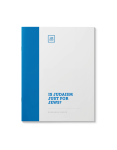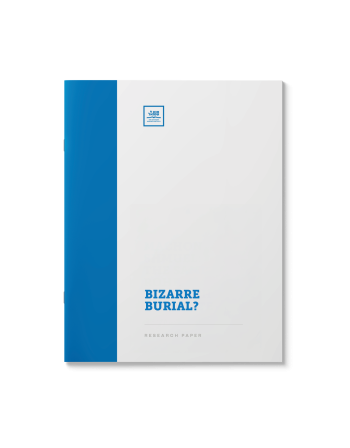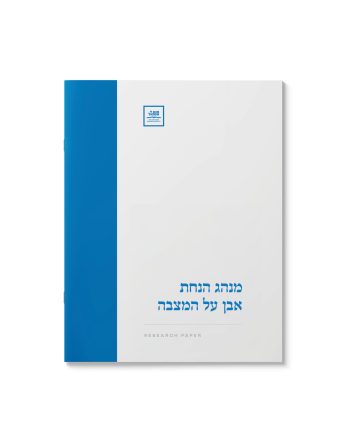מצוה לקיים דברי המת
$39.00
בירור מקיף ותמציתי על יסוד הדין של קיום דברי המת, ההגדרות והתנאים בזה.
| Language | Hebrew |
|---|---|
| Paper Type | Research Paper |
| Pages | 5 |
Related Products
A cornerstone of our belief is that a life of good deeds is rewarded with “a world that is truly good” in the Hereafter.
Is there another way? Can one “purchase” eternal reward on the open market? Can you get the “deal of a lifetime” (or the afterlife!) on ebay?
What are the Halachic principles of such a transaction? Can one buy or sell such ‘intangibles’? Would the transaction by valid, legal tender? Do “free market principles” and “art of the deal” apply? How does this compare to the historic partnership of Yissachar-Zevulun?
Includes a collection of stories about tzadikim who engaged in such “commerce” throughout the ages for the benefit of klal Yisroel.
Ancient Jewish sources indicate that Jews would bury their dead twice. What was the reason for this?
Were Jews historically buried in their own cemeteries? Why may
gentiles not be buried in a Jewish cemetery? This paper includes a review of a
number of ancient Jewish cemeteries around the world.
Many Jews won’t cut a boy’s hair until he is three years old. What is the history of this custom? What lessons does it hold for us? And does everyone have to keep to it?
“A single moment of repentance and good deeds in this world is greater than all of the World to Come” (Avot 4:17).
During the final stages of a terminal illness, a patient may endure pain and suffering with no hope of improvement. What measures must be undertaken to prolong the life of the patient?
What are the halachic requirements for administering nutrition, hydration, oxygen and antibiotics? Does the age or presence of mind of the patient play any role in the decision?
Although questions of this nature must be dealt with by a Rav moreh hora’ah b’poel on a case-by-case basis, this paper provides an overview of the relevant issues.
“Either way, they are My children” [Talmud].
Blood is thicker than water, they say. The bonds of family are the anchor of an emotionally and spiritually healthy life. But what happens to these relationships after one passes on? Do we “meet again on the other side”? Do families stick together in the hereafter? What about teachers and their pupils? Is this contingent on whether the two are buried in close proximity?
Do the souls of the departed maintain a relationship with those left behind? Do they relate to and empathize with the trivialities of our corporeal existence? Does prayer at their grave-site invoke merit on their behalf?
Without question, our prize possessions are the children we raise, and it is they who remain our legacy after we depart from the world.
Traditionally, children pledge funds to tzedakah and perform other good deeds in the merit of their deceased parents and loved ones.
What are the legal and philosophical arguments in defense of the idea that the deceased may enjoy the merits accrued by the good deeds of others? What if the individual was less-than righteous? Can the tzedakah by community members benefit their soul as well? What makes Yom Kippur a most propitious day to pledge tzedakah for the deceased?
מסתבר שכולנו בקיאים בתורה, או ליתר דיוק – היינו. אכן, במעי אמו, מלמדים להעובר כל התורה כולה. אלא כי רגע לפני צאתו לאויר העולם, בא המלאך ומשכחו. מהי אפוא מהותה ומטרתה של לימוד זו? ללמוד כדי לשכוח?
Guidance from contemporary Poskim on the permissibility of contraception. Reviewed by a Moreh Hora’ah.
Emulating G-d’s example, we are encouraged to visit and tend to the sick. Our presence is assured by the Talmud as having the power to heal a portion of the patient’s suffering. Does Halacha provide guidelines for the visitor in the performance of this mitzva?
Prayer, too, is an integral part of this mitzvah. What particular prayers should be said for their recovery? What about assisting the individual in the recitation of prayers during their final moments?
מנהג ישראל קדום להניח אבן על מצבת הקבר כשמבקרים בבית החיים. לפנינו סקירה כוללת על מקור המנהג וטעמו. הקיצו ורננו שוכני עפר.
This paper examines the elaborate rituals of taharas hameis. Why is the body laid on the floor during the process? Why are earthenware shards placed on the eyes of the deceased? Why is earth from the land of Israel scattered over the body?















